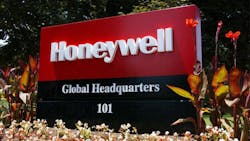Honeywell Discards 132-Year-Old Legacy as New CEO Sharpens Focus
Pressured by activist investor Third Point, Honeywell International Inc.’s new boss is ditching 132 years of corporate history in an effort to sharpen the company’s focus on its core businesses.
On the way out: automotive turbochargers and the household-systems operations, which include a thermostats business with roots that go back to the late 19th century. Chief Executive Officer Darius Adamczyk expects $3 billion from spinning off those units, and Honeywell will use the money to repay debt, buy back shares and prowl for acquisitions.
Adamczyk won the support of Daniel Loeb’s Third Point even after spurning its view that spinning off the aerospace division would unlock $20 billion in shareholder value. Honeywell will continue making cockpit control and jet engines, while also keeping its operations in building systems, catalysts for oil refineries, and safety and warehouse-automation equipment.
“All the remaining businesses offer options for investment and growth,’’ Adamczyk said on a conference call with analysts. “The punch line for me is, we’re going to be very active in the M&A arena.’’
The shares were little changed at $143.31 at the close in New York. Honeywell has advanced 24% this year, compared with a 13% gain for a Standard & Poor’s index of industrial companies.
“We are pleased that the board and management chose to conduct a thorough portfolio review and agreed that Honeywell should narrow its business focus,” Third Point said in a statement. “We are supportive of CEO Darius Adamczyk’s leadership.”
‘Strong Results’
The two spinoffs, which will be tax-free, are expected to be completed by the end of next year. They have combined sales of about $7.5 billion. Honeywell’s revenue last year was $39.3 billion.
The thermostats business traces its roots to 1885, when inventor Albert Butz created a device to regulate furnaces -- an innovation Morris Plains, N.J.-based Honeywell cites as its “genesis.”
“We believe the steps go beyond what most investors had expected, while we also believe most investors did not expect Honeywell to touch Aerospace,” John Inch, an analyst at Deutsche Bank AG, said in a note to clients. “In turn, we believe these actions position Honeywell to shift toward an upward growth trajectory from a smaller revenue base with billions of capital available to fund future growth.”
The $3 billion boost from the spinoffs, coupled with free cash flow targeted for 2018, give the company $7 billion to deploy in the U.S. and $17 billion globally, Adamczyk said. He vowed to maintain a judicious approach to any potential deals.
“The M&A market is a little frothy,” he said in an interview. “It seems to be a little bit more a seller’s than a buyer’s market. Having said that, we’re very active. We’re participating. We’re out there. We’re just going to stay disciplined in terms of what we pay for transactions.’’
Providing a preview of third-quarter earnings, Honeywell said “strong results” at the aerospace business and in the performance-materials and technologies operation helped boost sales by about 3 percent. Earnings are expected to rise to around $1.75 a share, compared with the $1.74 average of analysts’ estimates compiled by Bloomberg.
Adamczyk took over March 31 from Dave Cote and has been reviewing Honeywell’s businesses. Third Point urged the aerospace spinoff in April.
Cote, who is staying on as chairman until next year, built up Honeywell with a series of moderately sized deals such as last year’s $1.5 billion purchase of warehouse-automation company Intelligrated.
His goal of a $90 billion merger with United Technologies Corp. fizzled last year when the target rebuffed the proposal and customers including planemaker Airbus SE opposed it.
Turbochargers, ADI
The auto-parts unit will generate about $3 billion in annual revenue and have a workforce of 6,500 employees, Honeywell said. The household-systems business, which includes air-conditioning controls and the ADI security-technology brand, is expected to post $4.5 billion in sales and employ 13,000 people, Honeywell said.
The automotive business had shown promise of outpacing the car industry as vehicle manufacturers used turbochargers to cut weight and emissions while retaining power. Growth prospects diminished as the percentage of engines with turbochargers increased, denting future demand, and the threat of electric-vehicle sales sharpened.
The automotive unit shrank in 2014 after Honeywell sold off a brakes business to Federal Mogul Corp. for $155 million. The operation was tucked under Honeywell’s aerospace division, where it didn’t quite fit. In 2013, the last full year Honeywell broke out financial results for the business, segment profit margin of 13.3% trailed the company average of 16.3%.
By Thomas Black
About the Author
Bloomberg
Licensed content from Bloomberg, copyright 2016.
